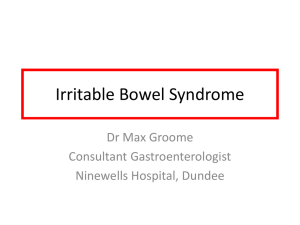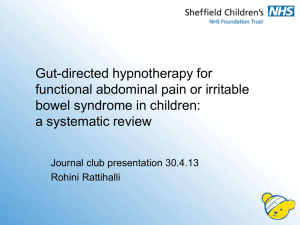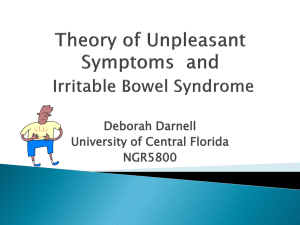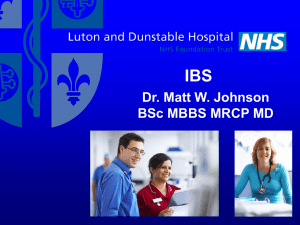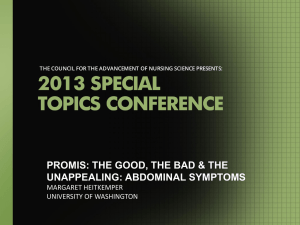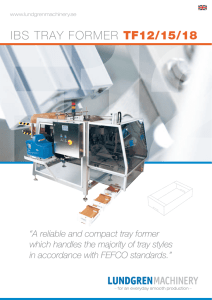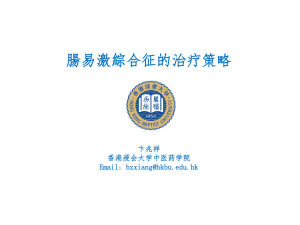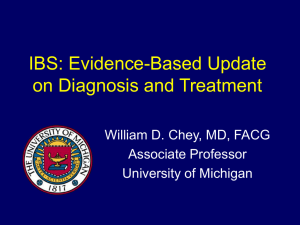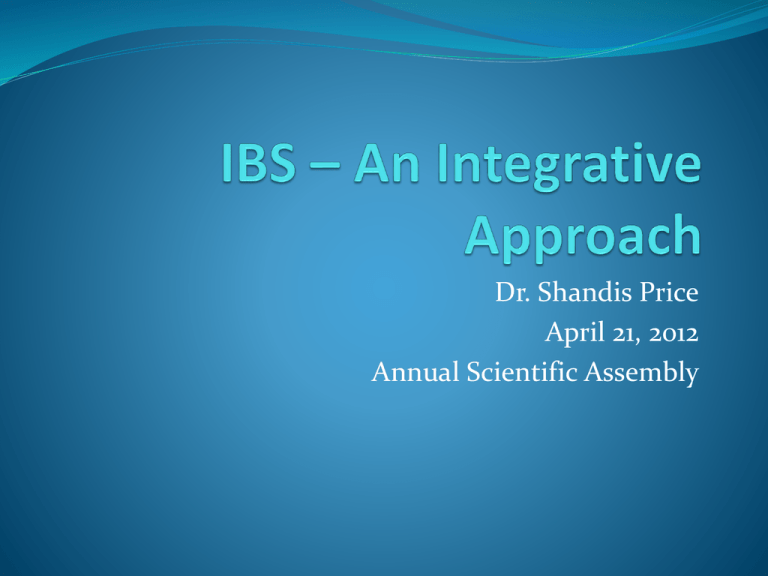
Dr. Shandis Price
April 21, 2012
Annual Scientific Assembly
Objectives
To review diagnosis and pathophysiology of IBS
To review diet and IBS
To become aware of botanicals that may be useful in
the management of IBS
To review probiotics, acupuncture and mind-body
treatments for IBS
IBS - definition
A syndrome characterized by chronic abdominal pain
and altered bowel habits without an organic cause
Most common GI disorder
More common in women and younger patients
Abdominal pain usually crampy
Often worse after eating and with emotional stress
Often better with defecation
Diagnosis
Rome III criteria (revised 2005)
Recurrent abdominal pain or discomfort
at least 3 days per month in the past 3 months
onset at least 6 months prior to diagnosis
associated with 2 or more of the following:
improvement of pain with defecation
Onset of pain associated with a change in frequency of stool
Onset of pain associated with a change in the form
(appearance) of stool
Diagnosis (cont’d)
Supportive Sx (not part of Rome criteria)
Abnormal stool frequency
</= 3 BM’s per week or >3 BM’s per day
Abnormal stool form
lumpy/hard, loose/watery
Defecation straining
Urgency
Feeling of incomplete emptying
Passing mucus
up to 50% pts with IBS describe passing mucus
Bloating
Diagnosis (cont’d)
Subtypes of IBS
Diarrhea predominant IBS
Hard/lumpy stools < 25%
Loose/watery stools >25%
Constipation predominant IBS
Loose/watery stools <25%
Hard/lumpy stools >5%
Mixed IBS
Hard/lumpy stools >25%
Loose/watery stools >25%
Diagnosis (cont’d)
Alarm symptoms
Rectal bleeding
Nocturnal or progressive abdominal pain
Weight loss
Abnormal labs
Age >50
FHx colon CA / IBD
Should get further investigations / colonoscopy
Investigations
Labs – CBC, lytes – should all be normal
Celiac screen
Meta-analysis (Ford, Archive Int Med, 2009)
Celiac disease 4x more common in patients with IBS than in
controls
Should check celiac screen on all patients with IBS
Stool cultures if diarrhea predominant IBS
r/o Giardia
Pathophysiology
Visceral hypersensitivity
more sensitive to visceral stimuli
Abnormal gut motility
Increased/decreased gut transit time
Increased motility to various stimuli compared to controls
Psychosocial factors
Brain-Gut interaction / neuroendocrine dysfunction
Latent or potential Celiac disease
Infection and inflammation
Post-infectious IBS, altered gut flora
Pharmacologic treatments
Antidepressants
TCA’s and SSRI’s
Antispasmodic agents
Eg. Pinaverium – Dicetel
Loperamide – (Immodium)
Selective serotonin (5-HT4, 5-HT3)reuptake inhibitors
Eg. alosetron, tegaserod
Ischemic colitis, CV events
Non-absorbable antibiotics (rifaximin)
Overall low patient satisfaction with pharmacologic
treatments
50% of patients with IBS turn to CAM therapies
Diet and IBS
Lactose (dairy)
Lactose intolerance is common
Can aggravate IBS or cause Sx that are similar to IBS
Trial of 3 weeks dairy-free diet for all patients with IBS
Diet and IBS
Gluten sensitivity (without overt celiac disease)
Latent or potential celiac disease
“non-celiac gluten intolerance”
Biesiekierski et al., Am J Gastroenterol. 2011
Double-blind randomized placebo-controlled trial of 34
patients with IBS controlled on gluten-free diet
Re-introduction of gluten for 6 weeks significantly worsened
Sx
Consider trial of gluten-free diet
Diet and IBS
Exclusion of gas-producing foods
Underlying visceral hyperalgesia
Exclusion of foods that increase gas production:
beans, cruciferous vegetables (broccoli, cauliflower, cabbage),
celery, carrots, raisins, bananas, prunes
Diet and IBS
Carbohydrate malabsorption – “FODMAP’s”
Fermentable
Oligosaccharides
Disaccharides
Monosaccharides
And
Polyols
May lead to Sx of IBS, increased intestinal
permeability and possibly inflammation
Oligosaccharides
Fructans (wheat, onions, artichokes)
Galactans (legumes, cabbage, and brussel sprouts)
Disaccharides
Lactose (dairy)
Monosaccharides
Fructose (honey, watermelon, high fructose corn syrup)
Polyols (sugar alcohols)
Sorbitol (chewing gum)
Xylitol
Mannitol
Some studies restricting FODMAP’s have suggested benefit
Consider trial of low FODMAP’s diet
Diet and IBS
Food allergies
Role is unclear
No reliable method of testing for food allergies
Diet and IBS (cont’d)
Elimination diets
Empiric trial to systematically remove certain food
allergens/sensitivities
“Sinister 7”
Cow’s milk, wheat, soy, corn, yeast, refined sugar, eggs
Can remove all 7 from diet x 14 days then systematically
re-introduce every 72 hrs
Or remove one at a time and then reintroduce
Botanicals and IBS
Several botanicals have been studied
Results limited by often small sample sizes and
substantial placebo response
Peppermint Oil
Anti-spasmodic – helps
with cramping
Slows gut motility /
transit time
Mechanism of action –
smooth muscle
relaxation via Cachannel blockade
Useful for diarrheapredominent IBS
Peppermint Oil
Meta-analysis (Ford, BMJ, 2008)
Peppermint oil effective in symptom relief in patients
with IBS
NNT=2.5 for benefit with peppermint oil
2009 American College of Gastroenterology
recommendations for the treatment of IBS
Peppermint oil recommended for short-term relief of
abdominal pain/discomfort in IBS
Peppermint Oil (cont’d)
Dose: enteric coated peppermint oil capsules
0.2mL tid
S/E’s:
anal burning and heartburn
Take peppermint oil capsules with food
Worthwhile to try first in diarrhea predominant IBS
Botanicals – Carminatives
Spices and herbs traditionally used for bloating and
gas
64% of patients with IBS complain of bloating
Also have other properties / secondary benefits
eg. antimicrobial properties, anxiolytic properties
Carminatives – secondary benefits
Basil – anti-inflammatory
Caraway - slows GI transit time
Peppermint - slows GI transit time
Ginger – pro-kinetic, anti-emetic
Cinnamon – insulin resistance
Thyme - coughs, colds
Dill – lactagogue
Sage - hot flashes/sweating
Ginger
Prokinetic and anti-
emetic
Useful in IBS –
constipation dominant
Useful for gas and
bloating (carminative)
Also used as an antiinflammatory (being
studied for arthritis)
Ginger (cont’d)
Dose:
dried powdered ginger
500mg dried ginger root – 1 tab tid before meals
safe in pregnancy
NOT concentrated extracts of ginger
Extracts used as anti-inflammatory
Can cause heartburn and GI distress at high doses and
safety not confirmed in pregnancy
Iberogast (STW 5)
Blend of 9 herbs / plant extracts
Candytuft
Chamomile
Peppermint
Caraway
Licorice root
Lemon balm
Celandine
Milk thistle
Angelica
Study (Madisch, 2004) –
double-blind placebo RC T
Showed effective in relieving
IBS symptoms
Fiber
Commonly recommended
May exacerbate symptoms in some patients
Fiber supplements (eg. psyllium) may be beneficial for
constipation predominant IBS
Main side effect is bloating and gas
Take with lots of water, titrate slowly
Probiotics
Living organisms that, upon digestion in certain
numbers, exert health benefits beyond those of basic
nutrition
Some commonly studied probiotics
Lactobacillus
Bifidobacterium
Saccharomyces boulardii
Probiotics (cont’d)
May be a role of altered gut flora in the pathogenesis of
IBS
Probiotics help balance the gut flora
McFarland, 2008
Meta-analysis of 23 studies showed improvement of
global IBS symptoms and abdominal pain
warrents further study
TuZen
Lactobacillus plantarum 299v
Acupuncture and IBS
Manheimer et al., April 2012, (Am J of
Gastroenterology)
Systematic review and meta-analysis of Acupuncture
and IBS
17 RCT’s (N=1806)
Acupuncture vs. sham acupuncture (5 trials) – no difference
Acupuncture more effective than pharmacologic therapy (5
trials)
Acupuncture equal effectiveness to bifidobacterium (2 trials)
or psycotherapy (1 trial)
Addition of acupuncture to standard medical care more
effective than standard medical care alone (2 trials)
Acupuncture (cont’d)
Mind-body and IBS
Dysregulation of the brain-gut axis
Visceral hypersensitivity
Stress plays a role in onset and ongoing IBS symptoms
Mind-body approaches have been investigated in
management of IBS Sx
Meditation, relaxation, hypnotherapy, CBT
Mind-body (cont’d)
Yoga and relaxation
Useful to recommend in patients with IBS, especially if
they are “stressed”
2 studies show benefit of yoga on IBS Sx
(Kuttner 2006, Taneja 2006)
CBT
Shown to be effective in IBS (Drossman, 2003)
Mind-Body (cont’d)
Hypnotherapy
Multiple studies have shown benefit in IBS
an intentional induction of the hypnotic state that is
achieved by various methods including deep relaxation,
mental imagery or more subtle indirect techniques
Good evidence to show that hypnotherapy is effective for
treatment of IBS and has long term benefits
(Gonsalkorale 2002, 2003)
2009 American College of Gastroenterology
recommendations for the treatment of IBS
Psychological therapies, including cognitive therapy,
dynamic psycotherapy and hypnotherapy more effective
than usual care in relieving global symptoms of IBS
Mind-body (cont’d)
Placebo effect and IBS
Kaptchuk et al 2010
Placebos without deception: A Randomized Controlled Trial
in Irritable Bowel Syndrome
- 70 patients with IBS, 3 wk RCT
"placebo pills made of an inert substance, like sugar pills, that have
been shown in clinical studies to produce significant improvement
in IBS symptoms through mind-body self-healing processes“ vs. notreatment controls with the same quality of interaction with
providers
Statistically significant improvement in global improvement scores,
reduced symptom severity and adequate relief scores
“Placebos administered without deception may be an effective
treatment for IBS”
Exercise
Increased physical activity may help with symptoms of
IBS
RCT (Johannesson, 2011)showed improved GI
symptoms in patients with IBS
20-60min moderate to vigorous activity 3-5x/week
Should be recommended to all patients with IBS
good for general health as well
Summary
Rule out celiac disease
Trial no dairy x 3 weeks
Trial gluten-free diet x 3 weeks
Can try elimination diet or low FODMAP’s diet if
motivated
Trial of peppermint oil if diarrhea-dominant or mixed
Trial of probiotics
Trial of acupuncture
Recommend exercise to all patients
Recommend trial of yoga, CBT, hypnotherapy
References
Borrelli et al., Effectiveness and safety of ginger in the treatment of pregnancy-induced nausea and vomitting. Obstet Gynecol. 2005 Apr;
105(4): 849-56.
Drossman et al., Cognitive-behavioral therapy versus education and desipramine vs. placebo for moderate to severe functional bowel
disorder. Gastroenterology. 2003 Jul;125(1):19-31.
Johannesson et al., Physical activity improves symptoms in irritable bowel syndrome: a randomized controlled trial. Am J Gastroenterol. 2011
May; 106(5):915-22.
Kaptchuk et al., Placebos without deception: A Randomized controlled trial in Irritable Bowel Syndrome., PLoS One 2010 Dec 22;5(12)
Kuttner et al., A randomized trial of yoga for adolescents with irritable bowel syndrome. Pain Res Manag. 2006 Winter;11(4):217-23
Manheimer et al., Acupuncture for Irritable Bowel Syndrome: Systematic Review and Meta-Analysis. Am J of Gastroenterology, 10 April 2012
Masdisch et al,. Treatment of Irritable bowel syndrome with herbal preparations: results of a double-blind, randomized, placebo-controlled,
multi-centre trial. Ailment Pharmacol Ther., 2004 Feb 1; 19(3):271-9.
McFarland LV, Dublin S. Meta-analysis of probiotics for the treatment of irritable bowel syndrome. World J Gastroenterol 2008; 14(17):265061.
Ford et al., Effect of Fibre, antispasmodics, and peppermint oil in the treatment of irritable bowel syndrome: systematic review and metaanalysis. BMJ. 2008 Nov 13; 337:a2313
Ford et al., Yield of diagnostic tests for celiac disease in individuals with symptoms suggestive of irritable bowel syndrome: systematic review
and meta-analysis. Arch Intern Med. 2009;169(7):651.
Gonsalkorale et al. Hypnotherapy in irritable bowel syndrome: a large-scale audit of a clinical service with examination of factors influencing
responsiveness. Am J Gastroenterol. 2002 Apr;97(4):954-61.
Gonsalkorale et al. Long term benefits of hypnotherapy for irritable bowel syndrome. Gut. 2003 Nov;52(11): 1623-9.
Manheimer et al., Acupuncture for Irritable Bowel Syndrome: Systematic Review and Meta-Analysis. American Journal of Gastroenterology,
10 April 2012
Ryan et al., Ginger (Zingiber officinale) reduces acute chemotherapy-induced nausea: a URCC CCOP study of 576 patients. Support Care
Cancer. 2011 Aug 5.
aneja et al., Yogic versus conventional treatment in diarrhea-predominant irritable bowel syndrome: a randomized control study. Appl
Psychophysiol Biofeedback. 2004 Mar;29(1):19-33.
Wu et al., Effects of ginger on gastric emptying and motility in healthy humans. Eur J Gastroenterol Hepatol. 2008 May; 20(5):436-40.
University of Arizona Integrative Medicine Fellowship – Integrative Gastroenterology - Irritable Bowel Syndrome.
Up To Date
Comments/Questions?

